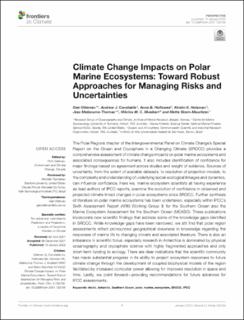Climate Change Impacts on Polar Marine Ecosystems: Toward Robust Approaches for Managing Risks and Uncertainties
Ottersen, Geir; Constable, Andrew J.; Hollowed, Anne B.; Holsman, Kirstin K.; Jess, Melbourne-Thomas; Muelbert, Mônica M. C.; Skern-Mauritzen, Mette
Peer reviewed, Journal article
Published version
Permanent lenke
https://hdl.handle.net/11250/3035264Utgivelsesdato
2022Metadata
Vis full innførselSamlinger
- Articles [3012]
- Publikasjoner fra CRIStin [3070]
Sammendrag
The Polar Regions chapter of the Intergovernmental Panel on Climate Change's Special Report on the Ocean and Cryosphere in a Changing Climate (SROCC) provides a comprehensive assessment of climate change impacts on polar marine ecosystems and associated consequences for humans. It also includes identification of confidence for major findings based on agreement across studies and weight of evidence. Sources of uncertainty, from the extent of available datasets, to resolution of projection models, to the complexity and understanding of underlying social-ecological linkages and dynamics, can influence confidence. Here we, marine ecosystem scientists all having experience as lead authors of IPCC reports, examine the evolution of confidence in observed and projected climate-linked changes in polar ecosystems since SROCC. Further synthesis of literature on polar marine ecosystems has been undertaken, especially within IPCC's Sixth Assessment Report (AR6) Working Group II; for the Southern Ocean also the Marine Ecosystem Assessment for the Southern Ocean (MEASO). These publications incorporate new scientific findings that address some of the knowledge gaps identified in SROCC. While knowledge gaps have been narrowed, we still find that polar region assessments reflect pronounced geographical skewness in knowledge regarding the responses of marine life to changing climate and associated literature. There is also an imbalance in scientific focus; especially research in Antarctica is dominated by physical oceanography and cryosphere science with highly fragmented approaches and only short-term funding to ecology. There are clear indications that the scientific community has made substantial progress in its ability to project ecosystem responses to future climate change through the development of coupled biophysical models of the region facilitated by increased computer power allowing for improved resolution in space and time. Lastly, we point forward—providing recommendations for future advances for IPCC assessments.
